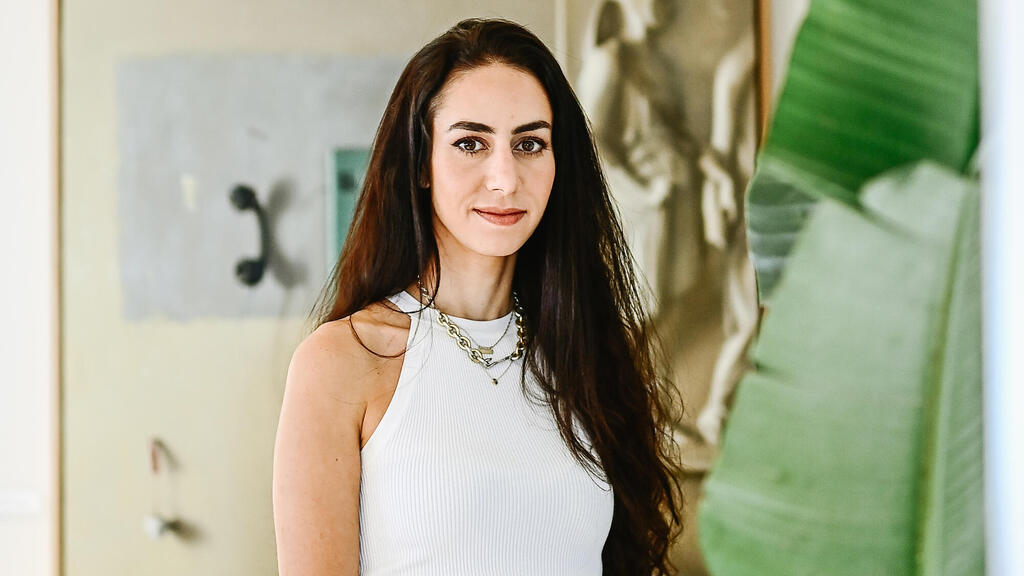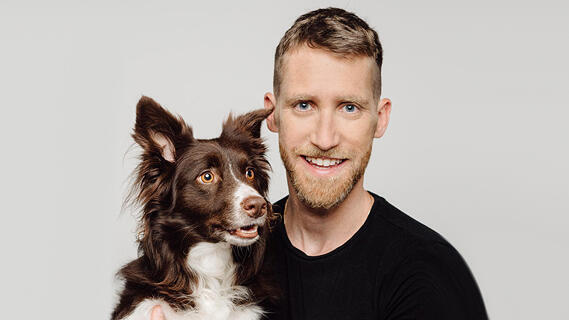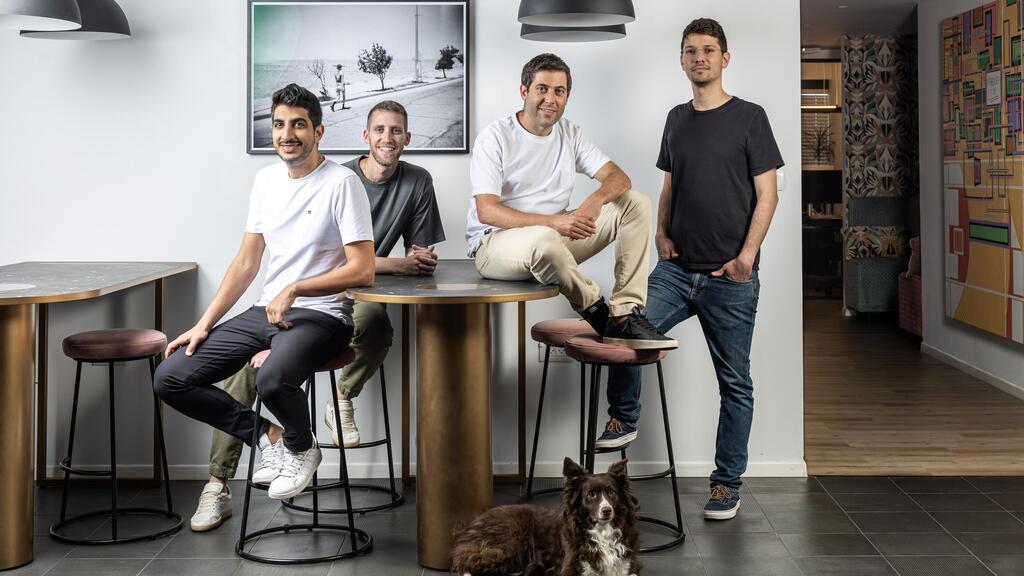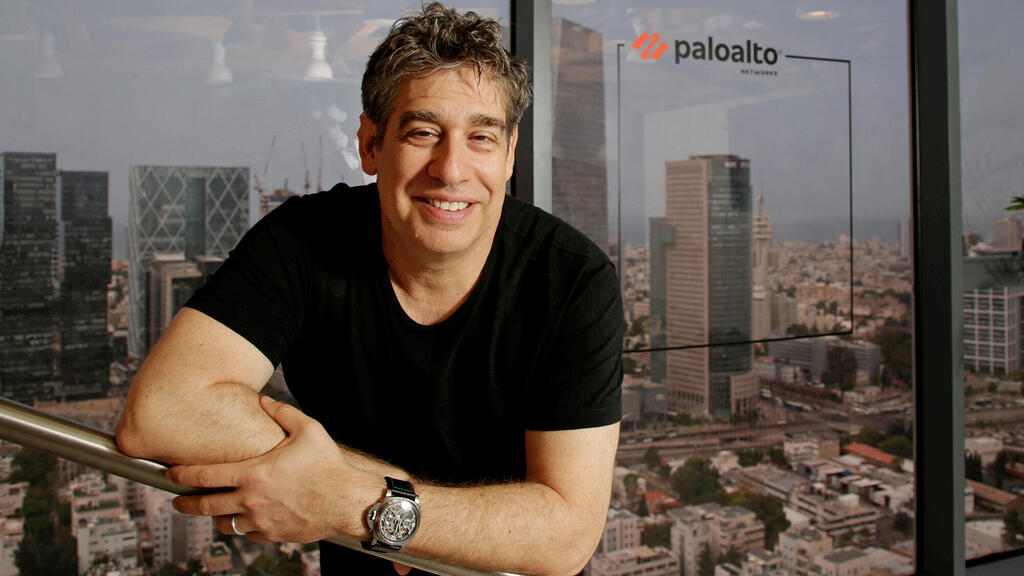Raaz Herzberg met Assaf Rappaport by chance on a shuttle bus. A short time later, she was the one who saved Wiz for him, when she made it clear that the startup he founded would not go far unless it significantly changed direction - and the rest is history.
In her first interview, CMO & VP Product Strategy at Wiz tells how the company will be the biggest in the world in the field, why it was wrong to accept Google's lavish purchase offer, why the connection with the group of founders is considered an opportunity rather than deprivation, and how she learned to embrace failure
Raaz Herzberg, 32, started her journey at Wiz, the successful Israeli cyber startup, on a shuttle bus. She worked as a product manager at Microsoft Israel, traveling there by bus. One morning she sat down next to Assaf Rappaport, then Microsoft Israel's CEO. "I sat down next to him simply because there was no other seat available," says Herzberg. "He is very friendly, so we started talking."
"Raaz sat next to me," Rappaport recalls, "we didn't know each other, but she was full of amazing ideas about what could be improved at the company. That meeting resulted in establishing an excellence program for young product managers. Since then, we had many opportunities to talk about security issues, and whenever I had doubts I would go to consult with her."
Rappaport was already an experienced entrepreneur and an admired manager. He reached the top at Microsoft management after in 2015 Microsoft acquired his cybersecurity company Adallom for $320 million, which he co-founded with his three partners, Yinon Costica, Ami Luttwak and Roy Reznik.
In 2019, when the four decided to move on and founded Wiz, Herzberg, the 27-year-old product manager from that chance meeting on the bus, was their first hired employee. To a large extent, that decision saved their company.
“I was hired to serve as a product manager at Wiz, reporting to Yinon,” Herzberg recalls. “It was during the COVID lockdowns, and we used the time talking to senior information security managers in organizations, who were our potential customers. We gave them presentations, ten a day, and asked for feedback. I remember presenting them the network security problem we intended to solve, while I heard on the other side of the line an American guy saying, ‘It sounds great'."
"After spending ten days in such conversations, as a product manager I was supposed to go to product developers, telling them 'this is what needs to be built,' but then I realized that I had no idea what I was asking them to build. It was frustrating because the conversations were too general, and I couldn't see what the solution was supposed to look like in detail."
Herzberg realized that the security product offered by Wiz, which had just been established, was not appealing to the customers because it did not address a different problem the customers were previously facing. She didn't hesitate to put forth her dramatic conclusion to Costica, telling him gently that the company he had started was not heading in the right direction.
She has just joined the company but listened to our conversations and told us: 'I don't understand what a difficult problem the product solves for our customers and why it is important,'" Costica said in an interview with Calcalist last year. "She was the first to alert that the product was not going in the right direction."
Rappaport also remembers this key moment: "It was at the very beginning, when we still called ourselves 'Beyond Networks' with a completely different idea. Raaz sat with us, the founding team, she felt like the dumbest one in the room, and the only one who didn't understand why the idea to start the company was good, and assumed that the problem was with her, while in fact it was with us. In retrospect, thanks to her we changed direction."
What made you decide to say to the founding members that they were heading in the wrong direction?
After the conversations I held, I could tell the difference between a customer who is saying 'It sounds interesting, we will catch up later', and a customer who is saying 'Wow, how much does it cost? I will connect you with my team', says Herzberg.
"Once I realized that none of us really fully understood what we were doing, we decided to make a sharp turn and move to engage in cloud security. We called it 'a suicide act' because it meant that we had to go to organizations who already had first-generation solution for cloud security, for which they have already paid, and we also knew that we would have to meet much higher standards, to have them purchase our product instead."
Weren't you afraid?
"The organizational climate here allows every employee to express their opinion and say things like, 'it doesn’t make sense to me'. It's like family, where you feel comfortable to say whatever crosses your mind, knowing that they are on your side."
Many excellent companies remain private for a long time, such as OpenAI.
Herzberg is CMO & VP Product Strategy at Wiz, responsible for a team of 50 people. She is the most senior woman at the young cybersecurity company, which is growing at an unprecedented rate for an Israeli company, and perhaps globally.
Five years since its establishment, Wiz's revenues reached half a billion dollars, its cloud security solution is used by 45 of the Fortune100, and just six months ago it raised $1 billion at an unimaginable $12 billion valuation. But an even bigger drama occurred this July, when Wiz rejected Google's $23 billion acquisition offer.
How can you say No to such an offer?
“Generally speaking, without referring specifically to Google, the sales in the cloud infrastructure security market in 2023 were about $550 billion. In 2024, it’s expected to grow to $680 billion. The market is growing at a crazy pace, we are close to its growth and fully believe in our ability to become the biggest company in the world in this field. It’s big, and it's not worth giving it up for any purchase offer."
Even if it’s $23 billion?
“CrowdStrike (which provides endpoint security) is worth today $75 billion, Palo Alto Networks (which engages in network security) is worth $120 billion. I believe we’ll be bigger because the cloud market is going to be bigger, and we have strong indications that our solution is the right one."
Some say that the valuation is overestimated.
“When Wiz raises funds, investors review its activity carefully, so they know that we are selling a solution to the most critical problem in the security market today. I'm highly familiar with the cloud security world and have engaged in the field for a decade, but today only 15% of organizations use the cloud. This means that we've just begun. Wiz has infinite potential, and that’s why, for now, we prefer to remain private.”
We?
"All the founders at Wiz believe that it should remain private. An IPO could be an amazing and exciting stop along the way, but still, it’s just a stop.”
So, when will you become public?
"We will not remain private forever, but there is no pressure. We managed to raise enough money, which allows us to go public when the time is right. In recent years, we see more and more excellent companies that remain private for a long time, and the private market knows how to support and finance them. Take OpenAI for example, and other companies that have raised billions and could have already launched an IPO."
Assaf Rappaport said he would consider IPO when you’d reach around a billion dollars in sales. You're halfway there.
“That’s definitely the goal, but there’s no rush."
Bloomberg reported that you're in discussions to sell existing shares at a valuation as high as $20 billion. Is this a fundraising round that hasn't been completed and was disclosed too soon?
I don’t comment on speculation. When a round is completed, we provide updates."
'I didn’t serve in IDF's Intelligence Unit 8200 and felt underqualified'
Herzberg’s journey to the heart of the cybersecurity industry did not follow the typical path. She served in the IDF in a technology unit after pursuing science and math majors in high school, "where there were scarcely three girls in the class."
When she finished her military service, she did not opt for R&D or Computer Science. "I didn’t want to work in high-tech and enrolled in economics and law studies at the Hebrew University. The truth is, I didn’t serve in the IDF's intelligence (prestigious) unit 8200, so I didn’t think I was qualified."
So, what happened?
"What happened was that waitressing was exhausting, and salaries in the tech sector are much higher. The truth is that I tried several times to move away from high-tech, and besides I have natural talent for painting, but in Israel there is tendency to work in the tech industry.
"I didn't want to do something purely technological, but when I started working at Ginger Software (which develops an AI-powered writing assistant), I saw the magic of a start-up where half the staff were linguists. That's the beauty of using technology as a tool to empower a different field.
"In the end, I enrolled in a demanding joint program of Computer Science at the university and Design studies at Bezalel Academy of Art and Design. During my studies I worked part time at Google as a software programmer, and then I moved to work at Microsoft as a product manager."
Studying for a dual degree while working at Google isn't an easy task.
"I completed my computer science duties, but haven't completed the degree at Bezalel due to workload. But during my studies, I managed to engage in many projects that combined the two fields."
So, you gave up painting?
"I painted in many formats over the years, and while working at Wiz I returned to engage in hyper-realistic oil painting. I studied once a week with the painter Erez Aharon, but recently, unfortunately, I can't find the time."
You ended up in high-tech by chance?
"I finished my studies and felt somewhat confused, finding myself interested in many fields. If by any chance the tech industry ceases to exist tomorrow, there would still be many things that fascinate me. Sometimes I regret not going to law school.
"Public advocacy also appeals to me. I’d love to bring reform to Israel Railways; I've traveled by train from Haifa to Tel Aviv for 12 years and the experience hasn’t changed to this day. My dream is to turn that ride into a 20-minute trip, like you see in other places around the world."
'I was completely overwhelmed, my legs were shaking'
Despite her lack of experience, Rappaport asked Herzberg to lead the company's global marketing team. "We had two very good American marketing managers in Silicon Valley, but we didn't feel that it was working. Then two years ago Assaf told me, 'I need you in marketing.' I found it somewhat absurd and replied that I was too busy; it made no sense to me, but he believed in me."
Despite the lack of self-confidence that she describes, Herzberg effectively became the fifth informal co-founder at Wiz, who is involved in every decision-making. Moreover, she is also the highest compensated employee in terms of the value of her stock options in the company.
What was the marketing problem that demanded your help?
"Wiz had an excellent product that customers didn’t know about. Each time we reached a new potential customer, they would say, 'It’s a shame we haven’t heard about you before, we already purchased another security product'. No one heard of Wiz, and that was a problem."
And what did you do?
"First we addressed the visual issue. I don't believe in fear-based marketing, using black or red colors. That's why at conferences we would use pink or light blue. At the RSA conference, where all the security companies participate and you have to pay a million dollars just to get space at the exhibition, I wanted everyone at the conference to pay attention to us. So, we built a stand with a 'Wizard of Oz' concept ('Wiz of Oz'), and since then we've been using similar marketing strategies."
How do you attract and preserve large customers?
"There's an inside joke of cybersecurity, saying that founders of big cybersecurity companies live on airplanes because they spend all their time meeting customers. These deals are worth millions of dollars, and the founders want to understand their customers and their needs in depth. So, it is necessary to meet the customers yourself – and it turned out that I became a significant "force multiplier". It was surprising, first and foremost, to me."
What are your success metrics as a marketing manager?
"In the past we had 30,000 followers on LinkedIn, and now we have 250,000. There's also an increase in the number of searches for the product, and, of course, in the number of deals closed in the past two years. Analysts who three years ago could write about cloud security without mentioning us, can no longer ignore us."
If you're so evaluated, why aren’t you a formal fifth co-founder in this 'boys’ club'?
"They knew me when I was just an employee at Microsoft but knew nothing about my capabilities. We didn’t have the kind of relationship that we have today. They’re a decade older than me, they are more experienced, and they asked me to do things at Wiz on a scale I’d never done before. We were all pleasantly surprised by my achievements, especially me.
"To some extent they took a risk having me; they would invite me to meetings from the beginning, making me feel comfortable to share my opinion, allowing me to speak with the biggest clients, unlike other companies, where the founders are the only ones allowed to speak to clients in the first two years. It’s really not obvious."
What did you discover about yourself?
"At Microsoft, I didn't do things on such a scale, and I was always accompanied by staff members. At Wiz, everything started from scratch. Ahead of discussing with one of the first big customers, they told me, 'we want you to close the terms of the agreement with this customer.' I was completely overwhelmed, my legs were shaking.
"When I was discussing with the security manager of a giant company, he started talking about what the contract should include for ARR (Annual Recurring Revenue) purposes. I had no idea what he was talking about, so I texted Assaf while we were still talking, asking 'what is ARR?' We keep the screenshot of this text message to this day. That discussion became our company heritage."
Don’t you feel like working in a 'boys' club' or a sense of regret that you didn’t establish a startup yourself?
"It doesn’t feel like 'boys' club' here. Ami is a national religious Jew, Yinon and Assaf have male partners - it’s a diversified workplace. I don't feel like I have to be 'one of the crowd'. I have a once-in-a-lifetime opportunity to be part of an exciting journey, at a company growing faster than any other in the world in terms of sales. I feel a deep sense of belonging and pride, and the title matters less to me. Will I start my own company in the future? Who knows."
And what will happen in the next company they establish?
"If they start a third company and don’t offer me to be a co-founder, that’s a different story. We've been engaging in the cloud industry to begin with; if customers want the best, they will come to us."
Let’s talk about competition. You’re talking about making Wiz the biggest company in the field, but you’re still far from your top competitors such as CrowdStrike and certainly Palo Alto, which has annual sales of $8 billion
"These are amazing companies, leaders in their field, but CrowdStrike is an endpoint security company, and Palo Alto is a network company. Most of their revenues come from these areas, and they were founded long before the cloud. Wiz is a cloud company. The market that Wiz wants to lead - the cloud security market - is larger than the endpoint or even network markets."
But the competing companies understand this too, this is why they acquired cloud security companies.
"In terms of cloud, we beat them, because their solution wasn’t formed for the cloud - it’s not their forte. H&M, for example, is a clothing chain that also started selling some furniture. That’s fine, but if you want the best furniture, you go to a furniture store."
There's a word get around that you’re selling packages at a loss to increase market share.
"If you ask people what’s bad about Wiz, they’ll say we are more expensive than our competitors. I’ll say again, the cloud has turned everything upside down. It’s the biggest revolution ever in the security field."
Did you open a bottle of champagne when faulty CrowdStrike software update caused operating systems crash worldwide?
"Absolutely not, my heart went out to them. It was a sad day for the entire market. This is a great company, and I admire the endpoint security brand they've built. The goal of our industry is to protect organizations and help them."
My mom taught me that one should strengthen what one is lacking
Herzberg grew up in Ramat Efal located in the center of Israel and she now lives in Tel Aviv with her partner. "My father, Amir, is a professor of computer science, and my mother, Nava, is a math teacher."
One can say that your tech path seems to have come from home.
"So it seems; but for both of my parents, who are divorced, hard work is more important than talent. My mother has a strong educational principle - one should strengthen what one is lacking."
How was that reflected in your upbringing?
"I have natural talent for painting. I've been really good at it since kindergarten, but my mom never felt the need to enroll me in a program to improve my painting skills. Instead, she sent me to Scouts and swimming classes - things that were harder for me. If it were up to me, I’d lock myself in a room, paint and read books. But my mom’s approach was 'wherever you're uncomfortable, that’s where you need to push yourself'."
Has it helped you throughout your career? Are you doing something today that you thought you would never do?
"I learned to put the fear aside and try, I wouldn't decide in advance that something is not for me. It's a default for girls to feel that they're not smart or good enough to do things, but I learned to put these feelings aside. I'm really willing to take the risk of failing. When I took on marketing – while candidates for this role are typically chosen from the U.S.
"I wasn't afraid of failing. I still think that if it turns out that I am not the right person to lead Wiz marketing, that would be fine by me. Failure is always deemed a bad thing, but in my view there is courage in flunking a challenging exam."
Why?
"People keep asking 'why aren’t there more women in the cyber industry,' and I’ve encountered one of the reasons for it throughout my life. Take high school for example; a girl who thinks she’ll get a C in the most challenging matriculation exam, will give up and go for the easier exam to get a higher score.
"Women who take computer science at university are doing great, but there are few of them, and women who were about to finish their degree with a score of 75 (C+) or lower, would quit, because of their high standards and perfectionism."
Get the Ynetnews app on your smartphone: Google Play: https://bit.ly/4eJ37pE | Apple App Store: https://bit.ly/3ZL7iNv
Israeli politician Gideon Sa'ar (MK for New Hope party), in contrast, had no problem thinking that he could be Defense Minister without having significant military background.
"Exactly, and women are on the opposite end of the spectrum. These gaps start at a very early stage and are reflected in the industry. Even when I arrived at Wiz, I said to myself, 'They must have made a mistake in hiring me; these Adallom guys will probably fire me'." That's how I really felt deep down, honestly. But over the years I've learned to say to myself, 'They believe in you, take the job. At worst, you'll fail'.'
And what will you say to your daughter one day, so she doesn’t grow up feeling that way?
"I’ll tell her that failing on the most difficult exam is worth more than getting an A+ on an easier exam. This debilitating fear of failure is a characteristic of women. I know that's true because I’m still struggling it. I’m always sure I’m going to fail, but I’ve learned to ignore that inner voice. I’ve learned to embrace failure."









